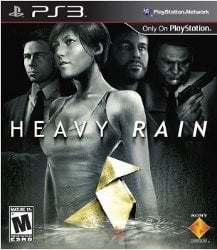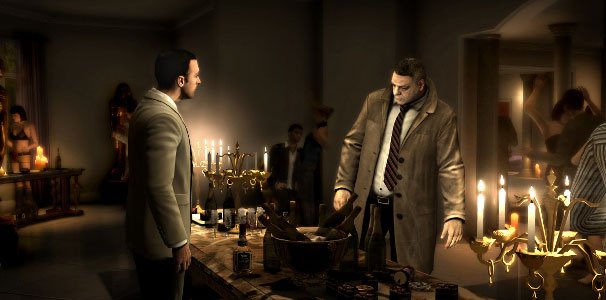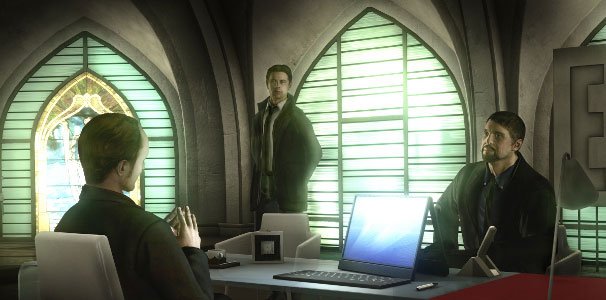
Your Daily Blend of Entertainment News
You are now subscribed
Your newsletter sign-up was successful
"Interactive drama," the phrase Heavy Rain director David Cage uses to describe the game, sends a cold shiver down my spine. I owned a Sega CD way back when, and remember the gaming industry's inept attempts to make "movies you can play". The average Sega CD game was live-action footage broken up with the occasional vague choice by the player. It was probably one of the worst experiments in gaming history so I was a bit apprehensive about Heavy Rain. However, the game shouldn't be feared.
Heavy Rain isn't live-action but its graphics are close to that mark. The diverse characters and environments have a stunning amount of detail. It doesn't look quite as good in motion; the animations are jerky and the game struggles at times to maintain a steady framerate. Regardless, what they've done with character models - particularly facial expressions - is impressive and makes the drama feel a bit more human.
One thing that might turn off players right away are the controls. Walking is performed by pushing the analog stick but you have to hold down R2 the entire time, too, which is as annoying as it is unnecessary. The characters walk slow, too, and turn like they're stuck in mud. There's no way to make your character run; they'll will only do so if it fits the situation (they're being chased or whatever). While the game's dogged devotion to story is admirable, there's little point to forcing players to slowly plod through every level.
The rest of the controls are a bit unusual but less of a problem. Unlike most games, Heavy Rain doesn't make you use the face buttons of the control very often. Their use is pretty much limited to fights or dialogue. Most motions are performed with the analog stick. You'll flick the analog stick down to open a drawer, roll it in a circle to wrap a bandage around an arm, and so forth. The pressure-sensitivity of the analog stick is utilized in some situations as well. To silently open a door, for example, you'll have to slowly push the stick in one direction. The Sixaxis motion control is used at times too, for kicking down doors or similar brute strength acts. Manuevers requiring a lot of coordination on the part of the character, such as crawling through a gap in barbed wire, are performed by holding down several buttons at once. The controls are very textured and feel more in tune with the actions your character perform than the standard Quick Time Events in other games.

While the central premise of the game - tracking down a serial killer called the Origami Killer - will interest a wide variety of gamers, it's the execution that will turn off many. While other games with a similar plot might simply offer up a series of gunfights and car chases, Heavy Rain is just as concerned with the nonviolent aspects of the story. In the first scene of the game, you play a father preparing a birthday party for one of his sons. At this point, I suspect some gamers will exclaim, "What the hell is this crap? I don't need to play a video game to put dishes on a table."
Some of the more honeyed reviews of Heavy Rain claim that you're an unrefined slob if you don't like a video game that makes you change a diaper. This is not some indie arthouse film, though - the central plot's basically a James Patterson murder mystery novel. A cop and serial killer plot is not so far outside the average gamer's tastes and if someone buys Heavy Rain, it's because they're interested in that type of yarn. If those players aren't enticed to keep playing, some blame has to be laid at the feet of the game.
It's easy to see how the game might be lost on some people. There is, admittedly, a lot of pointless repetition in the non-action scenes. On too many occasions, the player is asked by another character to fetch some nearby item for them (generally food and medicine). What exactly is this contributing to the game at all? Yes, we get it - it's demonstrating one character's affection for the other. This sort of thing loses its effectiveness the second (or third or...) time around, guys. Quantic Dream also makes the mistake of front-loading the game's beginning act with a lot of these types of sequences so players who might've enjoyed the more action-packed, later stages may give up on the game before they get there.
Your Daily Blend of Entertainment News
Still, the "peaceful" scenes in the game aren't pointless. Your ultimate goal in every situation is to find clues that will lead you to the Origami Killer. It's rarely just a matter of examining a crime scene or questioning a witness; often there's some sort of twist to raise the stakes. What those early sequences of fatherhood in the game do is lull you into a false sense of security. You go into scenes thinking it could be just another character development moment and then bam, you're suddenly in a life-or-death situation. For example, you visit a shop and get caught in the middle of a robbery.

These moments are really well done, too. Most games that rely on QTE's will kill you as soon as you miss one button prompt. However, Heavy Rain lets the scenes continue; a missed button means you're merely closer to death. Instead of dodging a gunshot, it may graze you and cause you to stumble. Even when you succeed, you don't get away unscathed. A successful attack by your character might be a clumsy shove. You can die/fail in these sequences - there are four playable characters so the story continues even if one dies - but the exact threshold for failure is never clear so each fight, chase, escape, and so on is filled with tension. There's often more than one resolution for a scene, too, so even if you survive it, you're never entirely sure if you did it "right."
While individual scenes and moments are enjoyable, the wider story doesn't work as well. Poorly written dialogue, delivered with flat voice acting, is part of the problem but not all of it. The story's real issues are due to structure. The game bounces between four playable characters so there are some unexplained gaps in the narrative. In some cases, your choices in the game lead to some plot inconsistencies. Toward the end of the game, one character called another character that they had never met before in my story. These characters could stand to be a bit more developed, too. The romance presented in the plot feels rushed and artificial.
It seems like David Cage (who wrote the game in addition to directing it) expended most of his energy trying to ensure players wouldn't guess the Origami Killer's identity before the end. In order to do that, he throws a dumps a wastebasket full of red herrings on the player's head. There are so many characters and little subplots that appear once and then fade into the background; it's as though they only exist in order to give the true killer a crowd to hide in. The killer's identity ends up being a surprise but it's at the expense of every other element of the game's story. We never get a chance to really meet the main characters because we're too busy tussling with all these random psychopaths that the game lobs at us. Even the killer doesn't feel completely fleshed out. His motives are confusing and his identity creates a number of plotholes.
Heavy Rain combines innovative controls and cleverly staged moments to keep the player on the edge of their seat. The game allows you to replay chapters you've completed, so after finishing the 10+ hour campaign you'll probably find yourself revisiting many scenes in order to earn Trophies and try out alternate story paths. It's much less likely that someone would play the entire campaign over, though. Heavy Rain's great little moments are strung together in a story that can only be considered "good for a video game." This is not the revolution that you might hope for, but there is some occasional brilliance to be found and other developers should take note.
Players: 1 Player
Platform(s): PS3
Developer: Quantic Dream
Publisher: Sony Computer Entertainment
ESRB: Mature
Rating:

Staff Writer at CinemaBlend.

